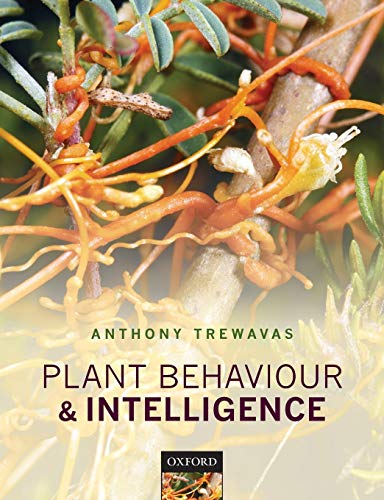Artículos relacionados a Plant Behaviour and Intelligence

Sinopsis
This book provides a convincing argument for the view that whole cells and whole plants growing in competitive wild conditions show aspects of plant behaviour that can be accurately described as 'intelligent'. Trewavas argues that behaviour, like intelligence, must be assessed within the constraints of the anatomical and physiological framework of the organism in question. The fact that plants do not have centralized nervous systems for example, does not exclude intelligent behaviour. Outside the human dimension, culture is thought largely absent and fitness is the biological property of value. Thus, solving environmental problems that threaten to reduce fitness is another way of viewing intelligent behaviour and has a similar meaning to adaptively variable behaviour. The capacity to solve these problems might be considered to vary in different organisms, but variation does not mean absence. By extending these ideas into a book that allows a critical and amplified discussion, the author hopes to raise an awareness of the concept of purposive behaviour in plants.
"Sinopsis" puede pertenecer a otra edición de este libro.
Acerca del autor
Anthony Trewavas obtained his B.Sc and Ph.D from University College, London in Biochemistry and went to do post doctoral research at the University of East Anglia and the University of Edinburgh, where he became Professor of Plant Biochemistry, as well as undertaking numerous visiting professorships abroad. He has published 250 papers and two books, and is an elected Fellow of the Royal Society of London, the Royal Society of Edinburgh, and Academia Europea and has been elected as a Life Member of the American Society of Plant Biology.
"Sobre este título" puede pertenecer a otra edición de este libro.
EUR 6,45 gastos de envío desde Reino Unido a Estados Unidos de America
Destinos, gastos y plazos de envíoComprar nuevo
Ver este artículoEUR 2,25 gastos de envío en Estados Unidos de America
Destinos, gastos y plazos de envíoResultados de la búsqueda para Plant Behaviour and Intelligence
Plant Behaviour and Intelligence
Librería: WorldofBooks, Goring-By-Sea, WS, Reino Unido
Paperback. Condición: Very Good. The book has been read, but is in excellent condition. Pages are intact and not marred by notes or highlighting. The spine remains undamaged. Nº de ref. del artículo: GOR007858509
Cantidad disponible: 1 disponibles
Plant Behaviour and Intelligence
Librería: GreatBookPrices, Columbia, MD, Estados Unidos de America
Condición: New. Nº de ref. del artículo: 23732731-n
Cantidad disponible: Más de 20 disponibles
Plant Behaviour and Intelligence
Impresión bajo demandaLibrería: PBShop.store US, Wood Dale, IL, Estados Unidos de America
PAP. Condición: New. New Book. Shipped from UK. THIS BOOK IS PRINTED ON DEMAND. Established seller since 2000. Nº de ref. del artículo: L0-9780198753681
Cantidad disponible: Más de 20 disponibles
Plant Behaviour and Intelligence
Librería: GreatBookPrices, Columbia, MD, Estados Unidos de America
Condición: As New. Unread book in perfect condition. Nº de ref. del artículo: 23732731
Cantidad disponible: Más de 20 disponibles
Plant Behaviour and Intelligence
Impresión bajo demandaLibrería: PBShop.store UK, Fairford, GLOS, Reino Unido
PAP. Condición: New. New Book. Delivered from our UK warehouse in 4 to 14 business days. THIS BOOK IS PRINTED ON DEMAND. Established seller since 2000. Nº de ref. del artículo: L0-9780198753681
Cantidad disponible: Más de 20 disponibles
Plant Behaviour and Intelligence
Librería: Ria Christie Collections, Uxbridge, Reino Unido
Condición: New. In. Nº de ref. del artículo: ria9780198753681_new
Cantidad disponible: Más de 20 disponibles
Plant Behaviour and Intelligence
Librería: Rarewaves.com USA, London, LONDO, Reino Unido
Paperback. Condición: New. This book provides a convincing argument for the view that whole cells and whole plants growing in competitive wild conditions show aspects of plant behaviour that can be accurately described as 'intelligent'. Trewavas argues that behaviour, like intelligence, must be assessed within the constraints of the anatomical and physiological framework of the organism in question. The fact that plants do not have centralized nervous systems for example, does not exclude intelligent behaviour. Outside the human dimension, culture is thought largely absent and fitness is the biological property of value. Thus, solving environmental problems that threaten to reduce fitness is another way of viewing intelligent behaviour and has a similar meaning to adaptively variable behaviour. The capacity to solve these problems might be considered to vary in different organisms, but variation does not mean absence. By extending these ideas into a book that allows a critical and amplified discussion, the author hopes to raise an awareness of the concept of purposive behaviour in plants. Nº de ref. del artículo: LU-9780198753681
Cantidad disponible: Más de 20 disponibles
Plant Behaviour and Intelligence
Librería: GreatBookPricesUK, Woodford Green, Reino Unido
Condición: New. Nº de ref. del artículo: 23732731-n
Cantidad disponible: Más de 20 disponibles
Plant Behaviour and Intelligence (eng)
Librería: Brook Bookstore On Demand, Napoli, NA, Italia
Condición: new. Questo è un articolo print on demand. Nº de ref. del artículo: 4411c1d80ecb354b361fef47d01cd445
Cantidad disponible: Más de 20 disponibles
Plant Behaviour and Intelligence
Librería: GreatBookPricesUK, Woodford Green, Reino Unido
Condición: As New. Unread book in perfect condition. Nº de ref. del artículo: 23732731
Cantidad disponible: Más de 20 disponibles

